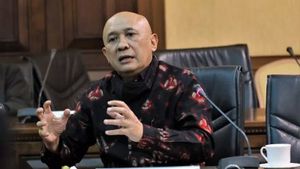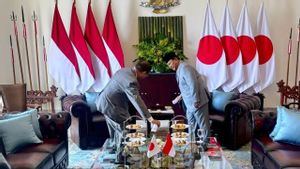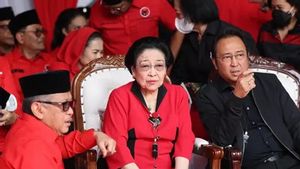JAKARTA - The government through the Ministry of Cooperatives and SMEs (Kemenkop UKM) is currently working on a revision of the Draft Law or Cooperative Bill. Deputy for Cooperatives of the Ministry of Cooperatives at the Ministry of Cooperatives and SMEs Ahmad Zabadi believes that the revision of the Cooperative Bill will make cooperatives more adaptive.
"Institutional operations are more agile, agile, and adaptive in running various types of businesses for the next decades," said Zabadi in his official statement, quoted Friday, August 18.
Kemenkop UKM is known to target the change in the Cooperative Bill to be completed in 2023. Zabadi explained that the purpose of this change in rules was to encourage cooperatives to be healthier, stronger, independent, and more resilient.
He also said that there were five efforts made by the government in the revision of the Cooperative Bill. The first effort is to open up opportunities and encourage cooperatives to be able to organize businesses or businesses in all business fields.
Second, increasing protection for members and cooperative legal entities from various potential irregularities or criminal acts that occur.
For the third effort, it is to increase compliance standards and good governance in accordance with cooperative identity/identity. Fourth, modernizing cooperative institutions so that they are more agile and compatible with the challenges of the times.
The last effort is to strengthen the cooperative ecosystem in general and savings and borrowing in particular (with the Supervisory Authority of Cooperatives and Cooperative Deposit Insurance Corporations).
Zabadi also underlined that the revision of the bill will modernize cooperatives in the future. Various updated provisions such as membership, capital, and governance.
On the capital side, said Zabadi, a member's capital term as a member's capital will be introduced as a member-sourced capital with characteristics can be expressed in certain units.
"The goal is to motivate members, increase their capital participation. Then, in governance, two models are adopted, namely level two and level one, of which people can choose one of them," he said.
Meanwhile, Chairman of the Indonesian Consortium For Cooperative Innovation (ICCI) Committee Firdaus Putra said that many cooperatives from the beginning did not formulate their business models and prospectus properly. Thus, cooperatives tend to be managed as interim activities, not like professional companies.
SEE ALSO:
"As a result, many cooperative administrators do not receive honorariums," he said.
ICCI also conducted a survey on this matter with 614 cooperative respondents in July 2022. As a result, as many as 40.5 percent of the management and 49.8 percent of supervisors did not receive honorariums at all.
Then, most received honorariums of only under two million rupiahs, management of 44.3 percent, and supervisors of 42.4 percent.
The survey also found the fact that 70.1 percent of cooperatives do not have managers or heads of operations. Thus, it is difficult to imagine cooperatives being managed seriously and seriously if the key human resources do not get a decent remuneration.
"This must be changed in the future through the revision of the Cooperative Bill," he said.
The English, Chinese, Japanese, Arabic, and French versions are automatically generated by the AI. So there may still be inaccuracies in translating, please always see Indonesian as our main language. (system supported by DigitalSiber.id)
















